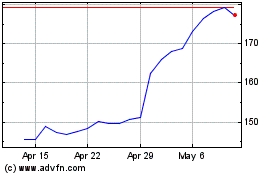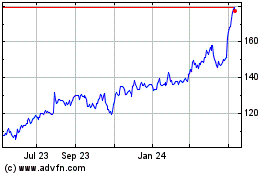Fallout Jeopardizes Proposal To Take Over Victoria's Secret -- WSJ
April 23 2020 - 3:02AM
Dow Jones News
By Khadeeja Safdar and Cara Lombardo
This article is being republished as part of our daily
reproduction of WSJ.com articles that also appeared in the U.S.
print edition of The Wall Street Journal (April 23, 2020).
Private-equity firm Sycamore Partners wants to scrap its plans
to take control of Victoria's Secret, a high-profile legal test of
whether the coronavirus pandemic allows a buyer to walk away from
an agreement reached before the outbreak.
The investor said the decision by L Brands Inc., parent of the
lingerie brand, to close its U.S. stores in March, furlough the
majority of its workers and skip April rent payments were
violations of the proposed transaction, according to a lawsuit
filed by Sycamore in a Delaware court Wednesday. The firm is
seeking the court's blessing to break the deal.
Shares of L Brands, which is also the parent of Bath & Body
Works, fell 15% to $10.19 in Wednesday's trading. The shares were
trading above $20 in February.
In a statement, L Brands said it believes the termination of the
transaction is invalid and that it "will vigorously defend the
lawsuit and pursue all legal remedies to enforce its contractual
rights." The company said it would continue to work toward closing
the deal. It is preparing a legal response that could be filed as
soon as Thursday, people familiar with the matter said.
L Brands in February agreed to sell a controlling stake in the
chain and its Pink brand to Sycamore for $525 million. As part of
the deal, longtime leader Leslie Wexner agreed to step down as
chairman and CEO. The deal valued the lingerie brand at $1.1
billion.
Sycamore tried to renegotiate the original contract for a lower
price earlier this month, said people familiar with the matter.
Last week, L Brands said it had no obligation to renegotiate the
price or other economic terms, according to the court filing.
The economic fallout and uncertainty from the coronavirus
pandemic has brought new deal discussions largely to a halt and
caused buyers like Xerox Holdings Corp. to drop proposed tie-ups.
In the U.S., announced merger activity this year has dropped 57%
from the same period last year to $233.7 billion, according to
Dealogic.
The environment has claimed few deals that were already signed.
Most deal contracts leave little room for cold-footed buyers to
walk away, mergers and acquisitions lawyers say, though they
sometimes use the threat to negotiate a better deal.
Prior to Sycamore's filing, the highest-profile agreed buyer to
have a change of heart was SoftBank Group Corp. The Japanese
conglomerate, struggling to shore up its portfolio, said it planned
to back out of a deal to buy $3 billion worth of WeWork shares from
investors and former and current employees. It cited various
reasons including regulatory probes, though not the virus. A WeWork
special board committee sued SoftBank for breach of contract this
month and the two sides are set to face off in an early January
trial.
Aerospace suppliers Hexcel Corp. and Woodward Inc. mutually
agreed to ditch their all-stock combination in early April to focus
on responding to the pandemic's far-reaching impact on their own
businesses. Neither side had to pay a termination fee.
A few smaller companies have also had back-and-forths with
possible partners, including Bed Bath & Beyond Inc., which was
set to sell a small business to 1-800-Flowers.com before the
website sought to delay the close. Also, auto-parts maker
BorgWarner Inc., has accused target Delphi Technologies PLC of
breaching their merger contract.
Courts are generally reluctant to let buyers off the hook but do
occasionally, such as when Energy Transfer Equity LP got to walk
away from a deal to buy Williams Cos. over concerns about a tax
opinion in 2016. Verizon Communications Inc. was able to recut a
deal after Yahoo disclosed a data breach while their combination
was pending.
On March 17, L Brands said it was temporarily closing all its
U.S. stores. Ten days later, L Brands said it was furloughing most
of its workers as the coronavirus spread and states extended
shutdown orders. L Brands also drew down $950 million from a
revolving credit line, suspended its quarterly dividend and cut pay
for senior executives.
According to the Delaware lawsuit, Sycamore contacted L Brands
on April 2, saying it hadn't agreed to the actions and was
concerned the conditions necessary for the deal to close might not
be met. L Brands replied it was complying with their agreement.
The back-and-forth continued. Sycamore argued that L Brands had
materially breached the contract; L Brands rejected that
assertion.
Before the pandemic, L Brands was struggling with falling sales
as demand for Victoria's Secret bras and underwear cooled. Like
many other retailers, the company has lost out on the majority of
its revenue since closing its stores.
In March, the company temporarily halted sales on the Victoria's
Secret and Pink websites. It resumed the business after announcing
it had taken safety precautions at its distribution centers, such
as temperature checks and social-distancing measures.
Write to Khadeeja Safdar at khadeeja.safdar@wsj.com and Cara
Lombardo at cara.lombardo@wsj.com
(END) Dow Jones Newswires
April 23, 2020 02:47 ET (06:47 GMT)
Copyright (c) 2020 Dow Jones & Company, Inc.
Woodward (NASDAQ:WWD)
Historical Stock Chart
From Mar 2024 to Apr 2024

Woodward (NASDAQ:WWD)
Historical Stock Chart
From Apr 2023 to Apr 2024
